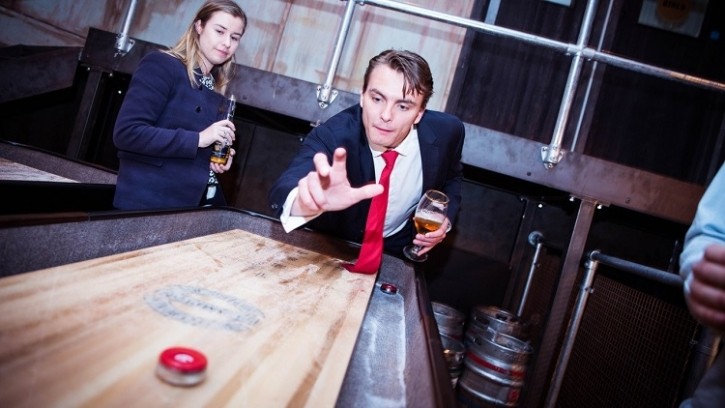What is shuffleboard and what can it bring to your pub?

What is shuffleboard?
Shuffleboard involves players sliding weighted pucks down a narrow table with the purpose of placing them in high-scoring areas of the table – the closer to the edge of the table, the higher scoring the slide.
The puck furthest down the board is the winner of the round, you only gain points if you win the round and you can only gather points from pucks that are further down the table than your opponents'.
Where does it come from?
Evans explains that despite the introduction of shuffleboard in its current form from abroad, it’s roots lie in Tudor Britain.
"It actually stems back from Henry VIII's time. It was predominantly played in pubs by the common folk when they'd use coins – it's a development from the 'shove a penny' game. Henry VIII banned it because it encouraged too much gambling in pubs.
“Long story short, it was taken to America and developed to what you see today, which is shuffleboard.”
Evans mentions that with a couple of tweaks, the game has been reintroduced to the UK in a new, beginner-friendly format.
"In America, it was predominantly played on flat tables. It was known as a bit of an old sport – something played by the elderly, a bit of a bowls reputation.
"My boss played on it and, having had a look at the engineering underneath the table, realised there was potential to put a bit of a curve in the table.
“It's like having the bumpers up in bowling; it entices the newbie.”
Why not go for pool or darts instead?
Evans adds that the playing field is very level in shuffleboard regardless of how often a customer has played before.
"You actually need a level of skill to take up darts or pool. You need to learn how to hold the cue, how to throw a dart. If you're playing against somebody who's already played the game you're at a huge disadvantage.
"With shuffleboard, you can be the newest person, or the most experienced person, and it'll still be competitive.
“All you have to do is push the puck down the table. It means you can be nine or 96, male or female, you can be the fittest person in the world or be in a wheelchair and you can still be competitive.
"The financial income versus pool, ping pong or darts is also substantial. We did a case study where we returned 750% more revenue from an area than ping pong did for one venue.
"If you're thinking of investing in having a band or entertainment, you've got to put a lot of money up to keep that entertainment going, whereas shuffleboard can get people in without any additional charge after that initial outlay."
How well is it doing in the UK?
Evans' company Shufl, based in Norway, has sold more than 800 shuffleboard tables to venues across Europe since 2009. Its presence in the UK has been growing since its introduction in January 2017, while other companies and operators have expanded the game's presence even further.
"We're up to around 15 venues in the UK, with another five coming online over the next few months as well."
After a slow start initially, pubs operated by BrewDog, Greene King and Stonegate are now host to shuffleboard tables, with Stonegate's Sports Bar & Grill in Canary Wharf, east London, the latest to hold a tournament – featuring 25 participants and the first tournament use of larger 22ft tables in London.
"There was quite a level of interest. The tournament started at 7pm and finished at about 11pm. The end of the group stages were at around 10pm so we were able to keep those 25 people in the bar on a relatively quiet evening for over three hours."
How can pubs make the most of it?
Evans advises that two tables encourage friendly competition and intrigue that can help an operator boost trade. However, tournaments need to be carefully thought out.
"For an unknown game, there's a lot of value in having two tables," he said.
"The big thing about a tournament is that you need to manage it to make people feel like they're always involved in the games, but also so they feel like it's not going on for too long. It's a bit of a balance.
"Ideally, for the bar, they want to keep the people in the bar for as long as possible.
"The best thing to do is not do a knockout tournament. You can have two big group stages with a short knockout phase. The value in that is that everyone's involved, they've all got to play four games each, so they're all waiting to improve on what they've done last time.
“The other added value is that if you get somebody playing on one table and there's a crowd in the bar, they're more likely to go and play on the second table.
"It really does encourage people to play or at least enquire about the game."
How much does it cost?
“Two tables would probably set you back over £20,000, but then the average return that we've had over the past year from two tables, per month, is over £3,000 just on game play alone. The average cost to play in the UK is £15 an hour.
"You can imagine the added drinks sales that these operators are having during times when possibly their bars are absolutely dead."











